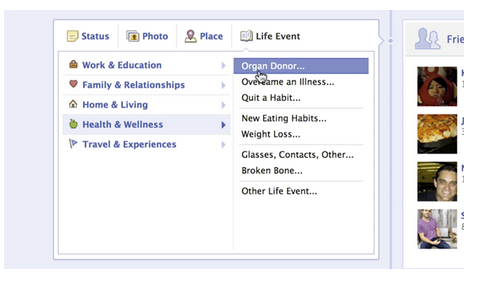How can social media have a big impact on public health? Here's one example: Facebook just introduced a feature that allows users to announce their status as organ donors, and to tell the story of when they decided to sign up as a donor. They're -- rightly, I think -- getting tons of good press from it. Here's NPR for example:
Starting today, the social media giant is letting you add your organ-donation status to your timeline. And, if you'd like to become an organ donor, Facebook will direct you to a registry.Patients and transplant surgeons are eager for you to try it out.
Nearly 114,000 people in this country are waiting for organs, according to the United Network for Organ Sharing. But there simply aren't enough organs to go around.
It's an awesome idea. Far too few Americans are organ donors, so anything that boosts sign-up rates is welcome. As Ezra Klein notes, organ donation rates would be much higher if we simply had people opt out of donating, rather than opt in, but that's another story. (And another aside: I hope they alerted some smart people beforehand to help them rigorously measure the impact of this shift!)
Call me a cynic, but I think the story of why Facebook chose to do this -- and in the way they did it -- is more interesting.Yes, there's altruism, but Facebook is a business above all. Maybe they're just trying to cultivate that Google ethos of "we sometimes spend lots of money on far-sighted things just to make the world a better place." Facebook will certainly garner lots of public good will from this.
But I think, even more importantly, Facebook gets magnificent cover for introducing new modules on health/wellness. Check out the screenshot from their newsroom post on the new features:
 That's right -- in the new Health & Wellness section you can enter not only whether you're an organ donor, but also these categories: "Overcame an Illness," "Quit a Habit," "New Eating Habits," "Weight Loss," "Glasses, Contacts, Others," and "Broken Bone."
That's right -- in the new Health & Wellness section you can enter not only whether you're an organ donor, but also these categories: "Overcame an Illness," "Quit a Habit," "New Eating Habits," "Weight Loss," "Glasses, Contacts, Others," and "Broken Bone."
All life events some people may want to share, of course. But Facebook makes money off of advertising, and just think of how much money Americans spend on weight loss, or on trying to quit smoking (or more usually, continuing it), or on glasses and contacts. Then think how much more advertisers will pay to show ads to segments of the billions of Facebook users who have shared the fact that they're actively trying to lose weight.
Maybe Facebook has seen this sort of health data as a major growth area for some time, but was wary of introducing such features in the wrong way. On any other news day the introduction of these features would have triggered a new outbreak of the "Facebook feature prompt privacy outcry" and "Why does Facebook need your health data?" stories. Sure, we'll get some of those this time, but I think any backlash will pale in comparison to the initial PR bump.
I don't think there's necessarily anything wrong with the move, and I certainly welcome any boost in organ donor registration. It may just be that this is a case where Facebook's business interests in inducing us to share more of our personal information with them just happens to happily coincide with a badly needed public good. Either way, the execution is brilliant, because so far I've mostly seen news stories talking about how great organ donation is. And I just updated my Facebook status.